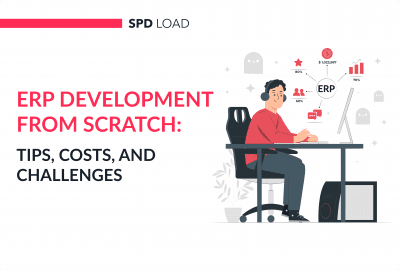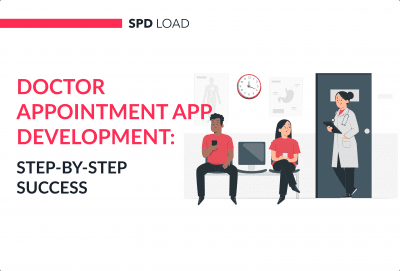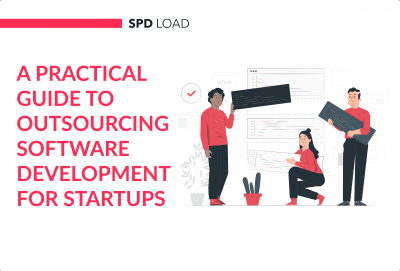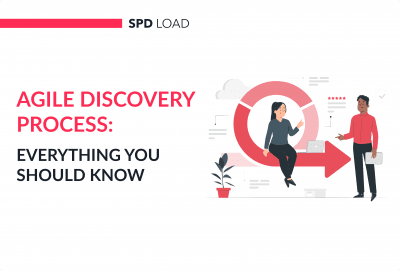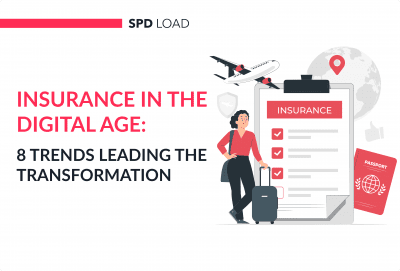How Much Does It Cost to Build Your Own HR Software?
- Updated: Aug 27, 2024
- 12 min
In today’s fast-paced business environment, startups face unique challenges in human resources, including recruiting top talent and managing regulatory compliance.
Custom HR software implementation can streamline workflows, increase employee satisfaction, and improve operational efficiency.
But how much does quality HR software development cost? What features and integrations make the investment worthwhile?
This article breaks down the key factors influencing HR software pricing, allowing you to make an informed decision for your growing organization.
Elevate your employee experience with tailored HR software — contact us today to get started!
Before diving into the specifics, let’s take a look at some statistics that highlight the growing importance of HR applications in modern workplaces:
- According to a recent survey, 85% of HR professionals believe that HR software positively impacts their organization’s efficiency and productivity.
- The global HR software market is projected to reach $24.8 billion by 2026, experiencing a compound annual growth rate (CAGR) of 10.2% from 2021 to 2026.
- An estimated 74% of companies have implemented HR applications to automate their HR processes and enhance employee experience.
Learn More About What HR Software Is
HR software, also known as Human Resources software or HRM (Human Resource Management) software, is a digital solution designed to automate and simplify HR tasks and processes within an organization.
It encompasses a number of applications and tools that cover various aspects of HR management.
At the same time, it allows startups to efficiently handle employee data, recruiting, performance and human capital management, payroll, benefits administration, and much more.
Looking for inspiration for your HR software? Feel free to explore the best HR software solutions on the market.
Key Capabilities of Human Resource Management System
Before we discuss the HR software cost breakdown, we’ll explore the benefits of this type of software solution.
1. Efficient Employee Data Management
It allows startups to maintain accurate records of employee information.
These include personal details, employment history, contact information, and employee performance metrics.
2. Seamless Recruitment and Onboarding
Startups often experience high volumes of recruitment, making the process time-consuming and complex.
It simplifies the onboarding process, allowing startups to effectively orient new employees.
This all happens with the help of the necessary documentation, training materials, and company policies.
3. Enhanced Performance Tracking
HR management software facilitates continuous feedback, 360-degree appraisals, and performance appraisal cycles.
In doing so, it promotes a culture of growth and development within the organization.
4. Streamlined Payroll and Benefits Administration
HR software automates payroll processing, calculating salaries, tax deductions, and generating pay stubs with accuracy and efficiency.
5. Improved Compliance and Reporting
Human resources software helps startups navigate regulatory and legal requirements.
It automates processes such as tracking vacation entitlements, managing overtime, and generating reports.
This way, startups can optimize their HR processes and focus on their core business goals.
But what types of HR software are there? Let’s find out. 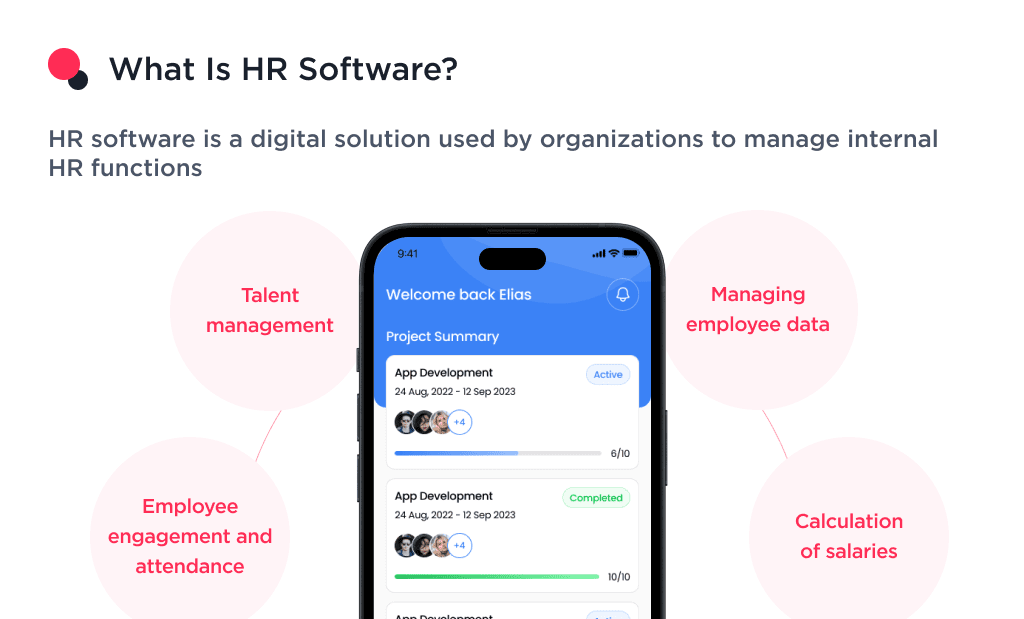
HR software comes in various forms, each catering to specific HR functions and organizational needs.
Common types of HR software include:
1. Core Human Resources
This type of software focuses on essential HR functions such as employee data management, payroll, benefits administration, and compliance.
Example: PeopleForce offers a comprehensive suite of core HR features.
Including employee data management, time and attendance tracking, leave management, and employee self-service portals.
2. Talent Management
This type is designed to facilitate processes related to recruitment, performance management, learning and development, and succession planning.
Example: BambooHR provides a talent management platform.
It includes tools for candidate tracking, onboarding, performance management software, and employee engagement.
It focuses on streamlining the entire employee lifecycle.
3. Workforce Optimization
This type of software helps organizations manage employee scheduling, time and attendance tracking, and workforce analytics.
Example: monday.com is a versatile work management platform.
It includes features for time tracking, resource allocation, scheduling, and task management.
It helps businesses effectively manage their workforce and optimize productivity.
4. New Hire Onboarding
It streamlines the new employee onboarding process by automating paperwork, task assignments, and training modules.
Example: Rippling is an all-in-one HR platform that offers a robust onboarding module.
It simplifies the adaptation process.
It automates tasks such as filling out forms, providing equipment, and managing access rights. 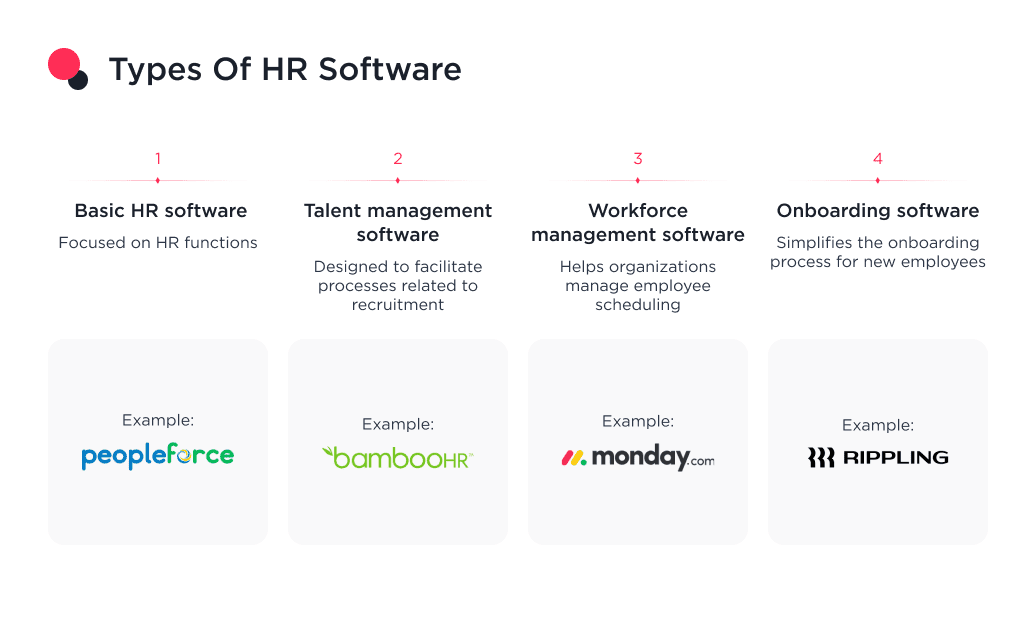
Choosing the right type of HR software is not the main task.
You need to understand what features your application will include.
Let’s find out now.
Must-Have HR Software Features
When developing custom HR software, identifying the essential features and functions to include is crucial.
Consider the following features commonly found in HR software:
1. Employee Records
A robust employee database is fundamental for HR software. It allows efficient storage and retrieval of employee information.
2. Payroll
Automating payroll processes ensures accurate and timely salary calculations, tax deductions, and compliance with labor regulations.
3. Performance Evaluations
Incorporating features for goal setting, performance reviews, and feedback helps organizations drive employee engagement and improve performance.
4. Hiring and Applicant Tracking System
An applicant tracking system simplifies the recruitment process by managing job postings, resume screening, and candidate communication.
5. New Hire Onboarding and Offboarding
Streamlining onboarding procedures and automating offboarding tasks saves time and ensures a smooth transition for new hires and departing employees.
6. Time Tracking
Tracking employee attendance, leaves, and working hours supports accurate payroll calculations and compliance with labor regulations.
7. Integration With Other Systems
The ability to integrate with other systems, such as payroll software, time-tracking tools, or third-party services, enhances the efficiency and effectiveness of the HR software.
Before finalizing your HR software development plans, it’s essential to understand the factors that can significantly impact the costs involved.
From the scope of features to the level of customization, various elements play a crucial role in determining the financial investment required. 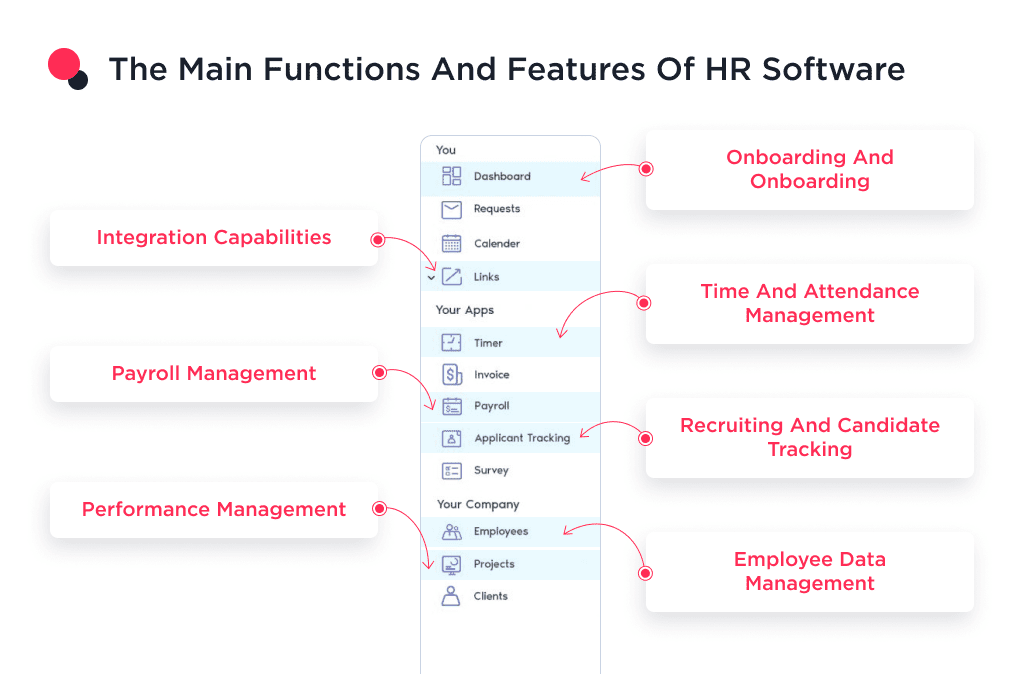
Let’s delve into these critical factors that influence HR software development cost.
Several factors influence the cost of developing HR software.
Factors That Influence HR Software Development Pricing
Understanding these factors can help you estimate and plan your budget effectively.
Here are some key factors:
1. Feature Complexity
The complexity and depth of the HR software’s functionality significantly impact development costs.
Basic features like employee data management and leave tracking are relatively simpler.
While advanced features like performance management, talent acquisition, or analytics require more extensive development efforts.
2. Customization and Integrations
If you need customization or integration with other systems, the development cost will increase accordingly.
These HR tools include project management software, payroll software, or time-tracking tools.
Customizations often involve additional development time and resources.
Choosing the best project management software is crucial for keeping projects on track and organized.
3. Number of Users
The number of users who will access the HR software affects the development effort and infrastructure requirements.
Systems that cater to a large number of users may require additional resources for scalability and performance.
4. User Interface and Experience
Investing in a well-designed UI and UX can enhance user satisfaction and adoption.
However, designing and implementing an intuitive and visually appealing UI/UX may increase the development cost.
Here, you can learn more about UI vs UX design and their role in user engagement.
5. Third-Party Integrations
If your HR software needs to integrate with third-party services, the cost may include integration fees and additional development efforts.
These services include background checks, benefits management, or recruiting platforms.
6. Security and Compliance
HR software handles sensitive employee data.
Therefore, incorporating robust security measures and ensuring compliance with data protection regulations (e.g., GDPR or CCPA) can lead to increased development costs.
7. Platform and Device Support
If you aim to support multiple platforms (web, mobile) and devices (desktop, tablet, mobile), the development effort and cost will increase to accommodate responsive design and testing across various environments.
8. Ongoing Support
Consider ongoing support and maintenance costs beyond the development phase.
This includes bug fixes, updates, and potential feature enhancements or system upgrades.
Transform your ideas into reality with HR software tailored just for your business
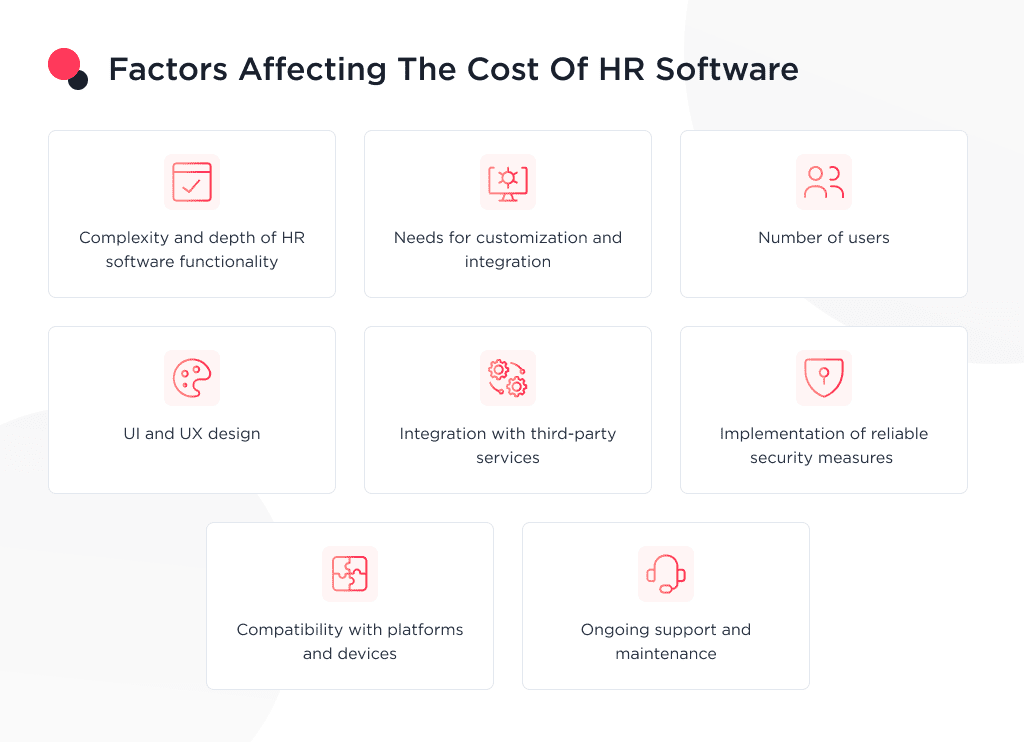
Estimating Development Costs
Determining the exact cost of developing HR software can be challenging.
It depends on various factors, such as the complexity of the project, the number of required features, the development approach, and the rates of the dedicated development team.
To get an accurate estimation of how much hr software costs, it is recommended to follow these steps:
1. Development Method
a) Off-the-shelf HR Software
If you choose an off-the-shelf HR software solution, the cost can range from $5,000 to $200,000.
It depends on the software features and the licensing model (perpetual or subscription-based).
b) Custom-Built HR Software
Custom development offers greater flexibility but comes with higher costs.
On average, the development of a custom HR software solution can range from $50,000 to $500,000 or more, depending on the complexity and scope of the project.
2. Features and Capabilities
The number and complexity of features significantly impact the development cost.
Basic HR software with core functionalities may cost between $50,000 and $150,000.
More comprehensive solutions with advanced features (performance management, recruitment, training, analytics) can range from $150,000 to $500,000 or higher.
3. Technology Stack
The choice of technologies and platforms can affect development costs.
For instance, web-based HR software typically incurs lower development costs compared to mobile or cross-platform solutions.
The specific tech stack required for your HR software can influence the overall cost estimation.
4. Design and User Experience
An intuitive and user-friendly interface is essential for HR software.
Design and user experience considerations may add approximately 10% to 30% to the overall development cost.
5. Integration
If you require integration with other systems (such as payroll software, time and attendance systems, or third-party APIs), the complexity of integration can impact the cost.
Integration efforts may add an additional 10% to 30% to the overall development cost.
6. Testing and Quality Assurance
Rigorous testing and quality assurance processes are critical for HR software.
This is to ensure its reliability and security.
Testing efforts can typically account for 10% to 20% of the development cost.
7. Maintenance and Support
After the initial development, you should consider ongoing maintenance and support costs.
These can range from 15% to 25% of the initial development cost per year, depending on the complexity of the software and the level of support required.
It is important to note that these figures are estimates.
They may vary depending on the specific project requirements, geographic location, and experience of the software development team.
To get a more accurate cost estimate customized to your HR software design project, you can consult with our mobile app designers.
We will be able to assess your specific needs and provide a detailed quote. 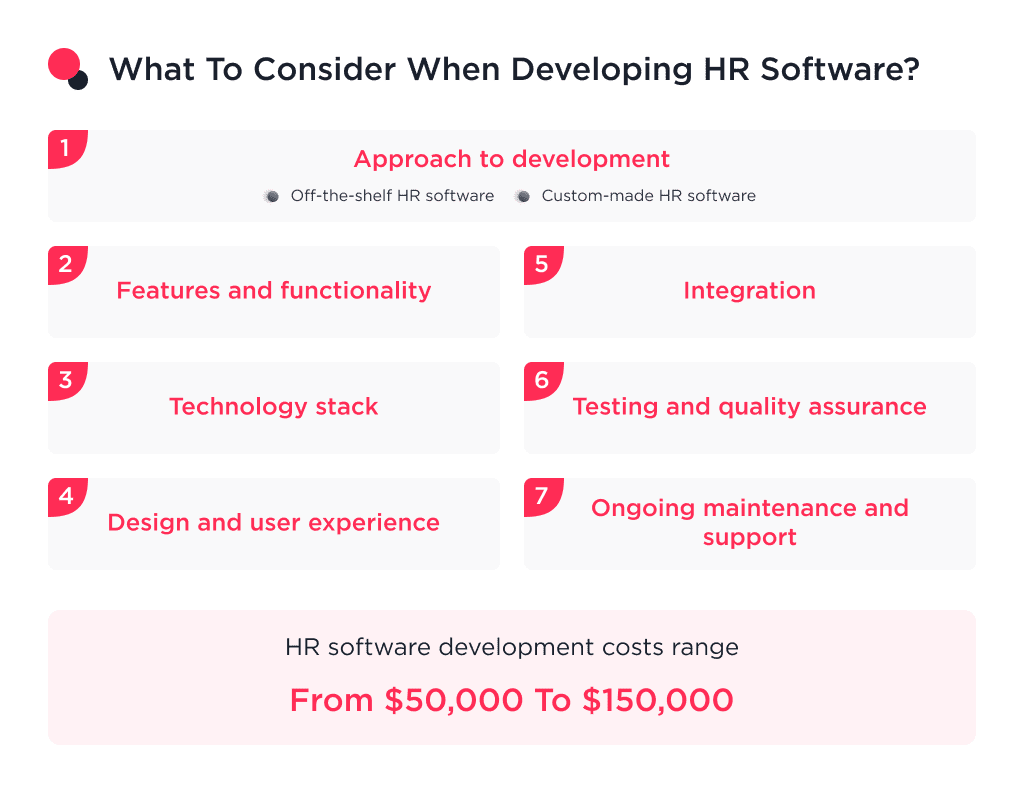
The cost of developing an HR system from scratch can vary depending on various factors.
They include the complexity of the application, the number of functions, the development approach, and the location and experience of the development team.
While it is difficult to give an exact figure without specific project details, I can give you a rough estimate based on industry averages.
On average, the cost of developing a basic HR application with basic features can range from $50,000 to $150,000.
This usually includes features such as employee data management, attendance tracking, leave management, and basic reporting capabilities.
For a more comprehensive HR application with advanced features, the cost can range from $150,000 to $500,000 or more, depending on the complexity and scope of the project.
These may include performance management, recruiting, training, analytics, and integration with other systems.
It is important to note that these figures are estimates and may vary depending on the requirements of a particular project, the geographic location of the development team, the technologies selected, and the level of customization required.
Factors That Determine the Cost of Development
Developer Location
The cost of HR software development can vary significantly depending on the country where the development team is based.
Here’s a general overview of the cost differences in different countries:
1. Europe
In European countries, such as Germany, France, or the Netherlands, the cost of HR software development is typically higher compared to other regions.
Hourly rates can range from $80 to $150 on average, resulting in higher overall development costs.
2. USA
The United States generally has higher development rates compared to many other countries.
Hourly rates for HR software development in the USA can range from $100 to $200 or more.
It depends on the location and expertise of the development team.
3. UK
The UK also has relatively higher development costs compared to some other regions.
Hourly rates for HR software development in the UK can range from $90 to $150 or more.
4. Australia
Australia tends to have higher development rates, similar to Europe and the USA.
Hourly rates for HR software development in Australia can range from $100 to $180 or higher.
5. Ukraine
Ukraine is known for its competitive rates in software development.
The hourly rate to hire a dedicated development team in Ukraine can range from $25 to $50.
This makes it a more cost-effective option compared to countries like Europe or the US.
6. India
India is recognized for its lower development rates compared to many other countries. Hourly rates for HR software development in India can range from $20 to $40, making it an attractive option for cost-conscious projects. 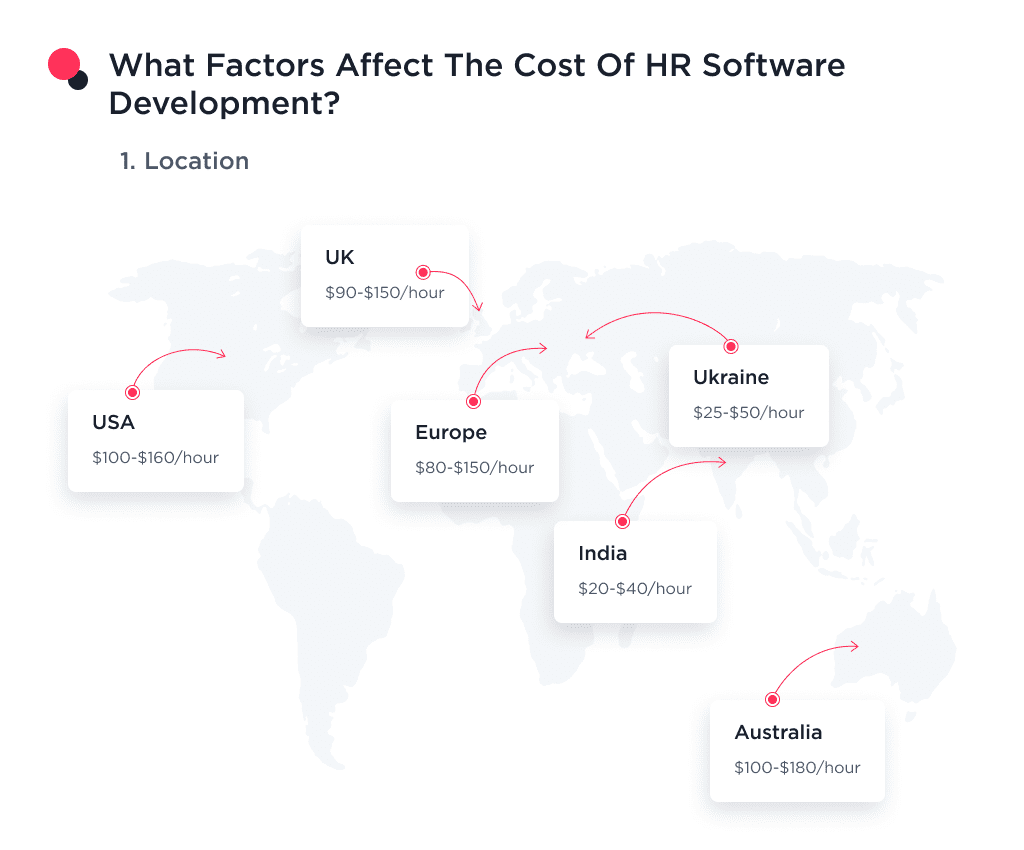
2. Developer Experience
The cost of HR software development can vary based on the experience level of the developer. Here’s a general breakdown of the cost range per hour for different experience levels:
1. Junior Developers (0-1 years of experience)
Junior developers usually have limited professional experience.
But they may possess the necessary skills to develop HR software.
The cost range for junior developers can vary from $20 to $50 per hour.
2. Middle Developers (1-3 years of experience)
Middle developers have gained some industry experience and may have worked on HR software projects before.
They possess a broader skill set and can handle more complex tasks.
The cost range for middle developers can range from $40 to $80 per hour.
3. Senior Developers (5+ years of experience)
Senior developers have extensive experience in HR software development and have likely worked on numerous projects.
They possess in-depth knowledge, technical expertise, and the ability to handle complex requirements.
The cost range for senior developers is generally higher, ranging from $80 to $150 or more per hour.
It’s important to note that these cost ranges are estimates and may vary depending on a number of factors.
Such as location, specific skills and experience of the developers.
Additionally, the rates mentioned here are meant to provide a general idea and may differ based on the country and market conditions.
When choosing developers based on their level of experience, it’s important to consider more than just cost.
Focus on their skill set, previous projects, and ability to effectively meet your project requirements.
The right balance between cost and experience should be determined based on the specific needs and complexity of your HR software development project. 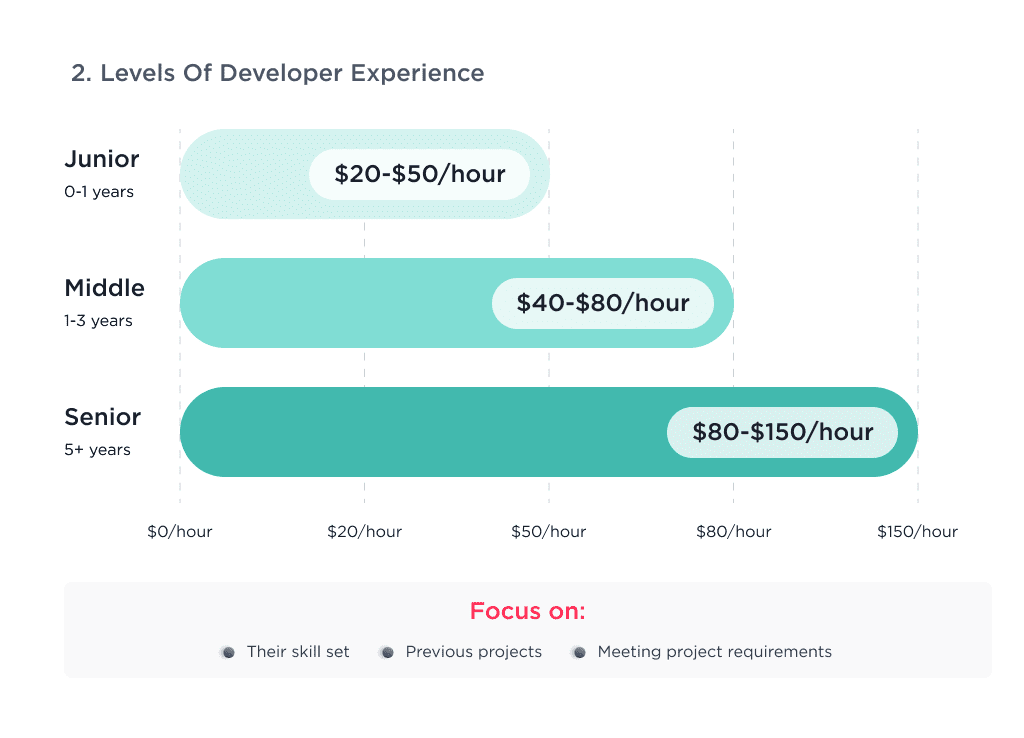
3. In-House vs Outsourced Team
The cost of HR software development can vary based on the type of development team you choose.
Here’s a breakdown of the cost range for different team types, specifically, in-house development vs outsourcing:
1. In-house Development Team
An in-house development team refers to hiring and maintaining a team of developers within your organization.
The cost can include salaries, benefits, infrastructure, and other overhead expenses.
The cost range for an in-house development team can vary widely depending on the location and the size of the team.
On average, the cost can range from $100,000 to $500,000 or more per year, depending on the team’s expertise and the complexity of the project.
2. Local Development Agency
Engaging a local development agency involves hiring a professional software development company within your country or region.
The cost can vary depending on the agency’s reputation, expertise, and the specific requirements of your HR software.
Hourly rates for local development agencies can range from $80 to $200 or more, depending on the country and the level of experience.
3. Outsourcing
Outsourcing involves partnering with a development team located in a different country or region.
This option is often chosen to benefit from cost advantages in certain regions.
If you’re considering outsourcing, check out the benefits of IT outsourcing for insights.
The cost can vary based on the outsourcing destination and the experience level of the team.
Hourly rates for outsourcing can range from $20 to $80 or more, depending on the country and the level of expertise.
Learn more about what is IT outsourcing and how does it work.
4. Freelancer
Hiring a freelance developer or a small team can be a cost-effective option for HR software development.
Freelancers typically charge on an hourly or project basis.
Hourly rates for freelancers can range from $20 to $100 or more, depending on their expertise, reputation, and the complexity of the project.
It’s important to consider not only the cost but also factors such as expertise, communication, reliability, and the ability to deliver within the desired timeframe when selecting a team type.
Each option has its own advantages and considerations, so it’s crucial to evaluate the specific needs of your HR software project before making a decision. 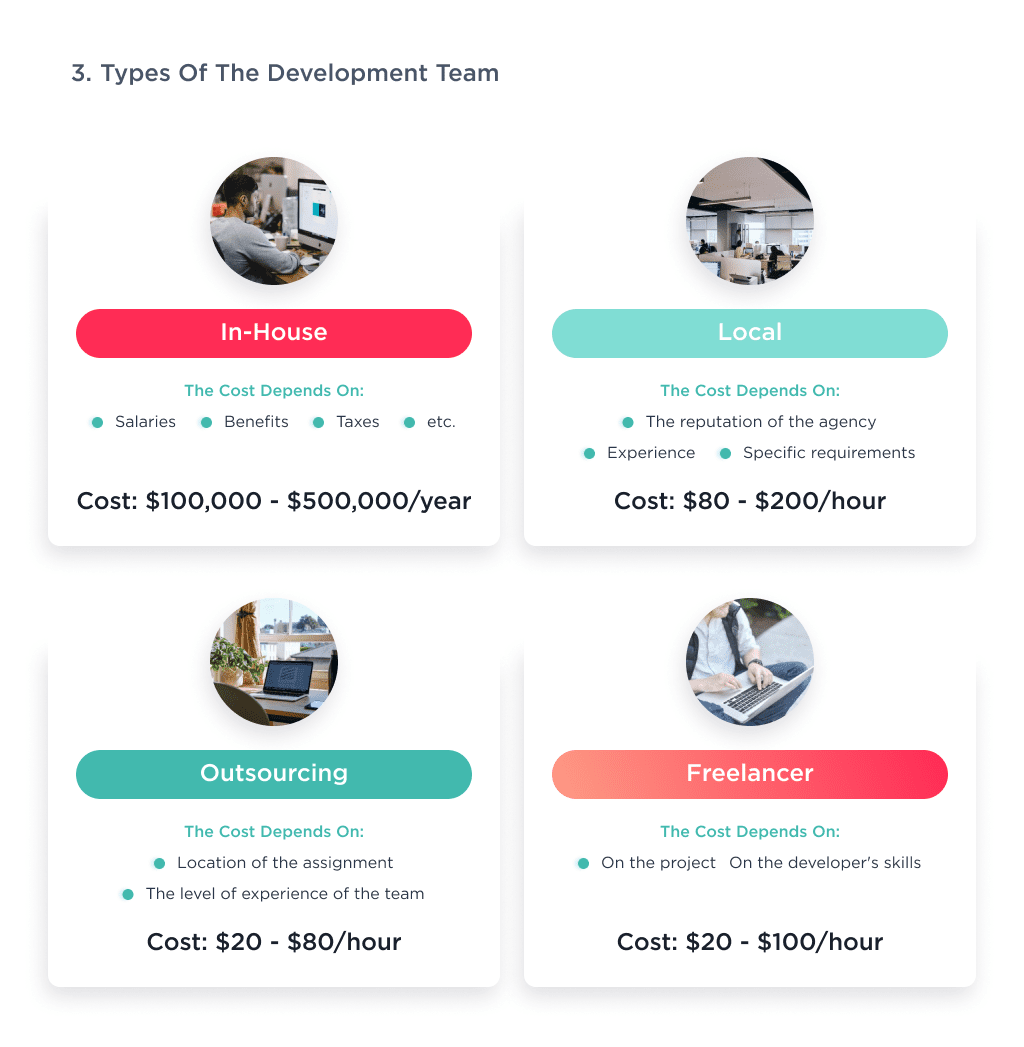
Looking for an HR Software Development Partner?
Custom HR software solutions deliver tremendous long-term value but require careful planning and realistic budgeting.
As you explore options, prioritize must-have features and choose a provider that listens and customizes solutions for your needs.
Looking for an experienced team to bring your HR vision to life? – We’ve built HR systems for organizations of all sizes for over a decade.
Contact us for a free consultation to discuss your software needs and how we can help you support your most valuable asset – your people.
Budgeting for an app? Our article on app development costs gives you the insights you need to plan your project smartly.





